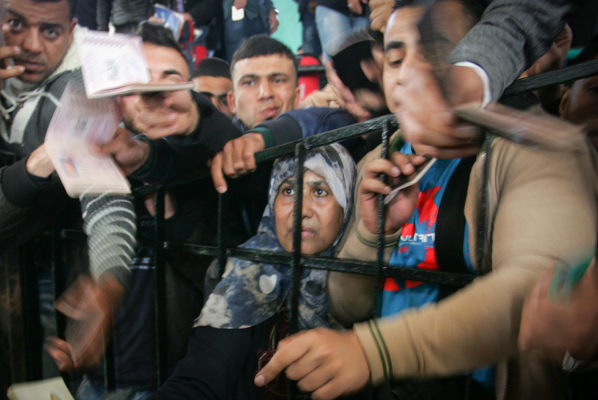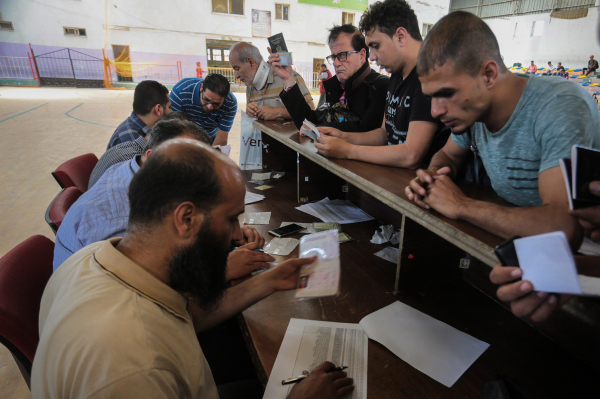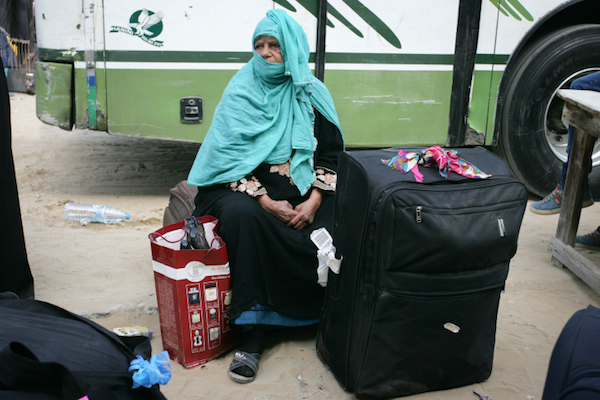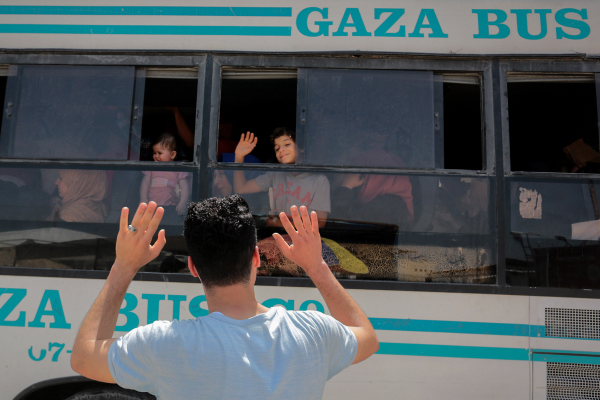Egypt has kept the Rafah crossing from Gaza continuously open since May, diverging from a years-long policy. But leaving the Strip is only the first of many challenges.
By Pam Bailey and Fadi O. Al-Naji

GAZA CITY — Um Ibrahim tried but failed to persuade her youngest son to reverse his decision to emigrate. The Gazan mother, who asked not to use her real name, has already “lost” two of her sons: one, a physician who managed to flee to Germany, and the other, also studying to be a doctor, to Portugal and then the United States. Now, her only remaining son is waiting his turn to leave Gaza via the Rafah crossing into Egypt, where he hopes to obtain a visa and join one of his brothers.
The young man has a relatively good job as an architect; he earns what is considered a rare, high salary of $1,000 a month. It is also tradition in Palestinian culture for at least one son to stay at home and care for his parents. Yet Um Ibrahim’s husband approves, and has even encouraged his last son’s departure.
“These last harsh years have totally convinced me that Gaza will never offer a shining future. I don’t want any of my children and their children to grow up with their dreams halted in every direction by walls,” he says.
This family is not unusual. According to a 2018 poll by the Palestinian Center for Policy and Survey Research, 50 percent of adults in Gaza dream of emigrating due to political, economic and safety conditions. Gaza is struggling with surging unemployment rates — the highest in the world — and more than two-thirds of its nearly 2 million population lives in poverty.
Brain drain
There are two ways to leave Gaza: the Erez crossing into Israel, which requires a very difficult-to-obtain permit that is only available to people who fall into specific, Israeli-defined categories, including those with serious illnesses and approved businesspeople; and the Rafah gateway to Egypt. Rafah is the only option for the vast majority of Palestinians living in Gaza.
Prior to May 2018, Rafah opened for only a few days a year, which the Egyptian government claimed was due to security concerns and a distrust of Hamas, the ruling Muslim Brotherhood-affiliated party in Gaza. It reversed course on May 12 of this year, agreeing to relieve pressure in Gaza by keeping the crossing open in both directions.
The perception abroad is that anyone from Gaza can leave now. The reality, however, is far from it. Six months after the so-called “opening” of Rafah, Gaza’s Interior Ministry says 23,000 Palestinians remain on the waiting list to exit.
One’s ability to escape from the prison that is Gaza all too often separates the “haves” from the “have-nots.” For example, not too long after the Rafah crossing opened, around 100 of Gaza’s most talented physicians left. Abdullatif Alhaj, the general director of hospitals in the Health Ministry, told the New Arab at the time that “we usually reject the resignations of these doctors because we need them. We always try hard to convince them to stay, but when they insist, we have no choice.”
Few can blame them. According to Dr. Mahmoud Sadaldeen, an anesthesiologist at Al-Shifa, Gaza’s main hospital, physicians in Gaza work long hours, often up to 15 hours during war or, recently, the Great Return March, during which Israeli forces have killed more than 170 Palestinians and injured more than 12,000.
“I always have been loyal to my land and my people,” says Dr. Sadaldeen. He is planning to leave as soon as he can, perhaps for the UAE. “I spent the entire 2014 war at the hospital offering medical treatment for injured people with love, away from my family. But it’s become unbearable. We are supposed to be paid a monthly salary of 6,000 ($1,600) shekels but I receive only 2,000 ($540). After paying on my bank loans, I only have 1,000-1,200 left a month. Sometimes I even have to buy my own drinking water from outside when I’m working because there is no water at the hospital! Isn’t that enough to think of emigration a thousand times?’’
However, Dr. Sadaldeen is fortunate; others have it even worse. “Most Gazans who make it out are the strip’s most resourceful, highly educated, promising, accomplished and sometimes wealthiest people,” notes Muhammad Shehada, a writer who himself left Gaza for Sweden two years ago.
The result is a brain drain that further endangers Palestinians’ prospects for economic prosperity or independence. Some think that Israel deliberately pushes people to leave, aided and abetted by Egypt. A July poll by al-Aqsa University found that 92.2 percent of the 1,280 Gazans surveyed believed the mass attempt to emigrate is consistent with the objectives of Israel’s occupation.

Playing the game
Left behind are the less fortunate; those without the financial resources, political connections or random luck needed to navigate the exit from Gaza. While some Gazans have been allowed to leave without forking over their life savings, those who can’t afford the months-long wait, like most students, who need to arrive at their new schools by a specific date, must pay a “coordination fee” (aka bribe) to Egyptian officials.
The going rate averages $1,500, although it can range as high as $7,000, depending on the person’s status, according to two middlemen who didn’t want to be named. That’s a small fortune for Gazans, most of whom live on under $4.60 a day. Even if they can scrape it together, they are left with nothing extra for expenses on the other side.
Ahmed Rezeq paid a bribe of $2,700 upfront to a local “travel office” so he could exit the strip to interview for a U.S. student visa in Cairo. The U.S. government does not maintain a presence in Gaza, requiring applicants to travel to Jerusalem instead. Israel is so sparing with its permits for such a trip (limiting them to certain days, when a bus takes them directly to the city) that the U.S. government often takes participants in its programs to Amman, Jordan, for the interview. However, entering Jordan requires another permit, so Gazans like Rezeq try traveling to Cairo. His mother sold the gold jewelry she had been given as part of her wedding dowry to pay for the bribe, but the intermediary turned out to be a crook. Rezeq wasn’t able to exit and the criminal kept the money, until Rezeq reported him to the police. Only part of the money was returned.
Rezeq eventually made it out of Gaza after following the practice everyone now knows is necessary: give the money to a friend, with instructions to pay the intermediary only when you are safely in Egypt. Although he had been accepted into a U.S. university and had a scholarship, Rezeq was not granted an American visa. Today, he studies international business at the American University of Cairo.
That’s what Ahmed Alnaouq, former project manager for WeAreNotNumbers.org, did when he escaped to Egypt in June, hoping to travel from there to another country to finally “see a little of the world.”
“Gaza gets very claustrophobic,” Alnaouq explains. “It is so small and so packed, and there is very little to do; every day seems the same. Only Israeli attacks break up the monotony — with fear.”
Nour Jamal, 24, who also made it into Egypt and then proceeded to Turkey, agrees. After graduating from university with a degree in English — a popular major, since fluency is critical to snagging one of the more lucrative international NGO jobs — he spent three years looking, fruitlessly, for work.
“In Gaza, instead of being able to concentrate on achieving your goals, you’re paralyzed by such basic things as electricity and water. Every single thing is a challenge,” he explains.
Both Jamal and Alnaouq scraped together the necessary coordination fee. Jamal paid $1,550 but was turned back three times before finally being allowed out.
In Alnaouq’s case, a “good Samaritan” from overseas stepped in. Using her donation, he gave $1,200 to a friend he trusted, who then completed the transaction once he confirmed he was safely in Egypt.
“It’s all done by word of mouth,” one Gazan, who didn’t want to be named, explains. “We know who the intermediaries are but have no connection with the Egyptians themselves. A little of the fee also goes to the intermediary and some to the Palestinian government officials at the border, but I can’t be specific. No one really knows the particulars.”

Hell at the border
Once Palestinians cross over to the Egyptian side of the border, “We enter a little bit of hell,” says Haneen, a writer for We Are Not Numbers who asked to be identified only by her first name. She is currently in Egypt on her way to Portugal, where she hopes to work for a couple of months as an interpreter in a school for refugees.
“When I got to the hall on the Egyptian side, I encountered a mess,” she recalled. “Some people were running around looking for their stuff or each other, but most were just sitting there, looking so tired and empty. I realized why soon enough,” she said. “We had to spend the night there, just waiting, while they processed everyone else who had come before. I tried to read, but I couldn’t focus because of the crying children and the moaning of old people trying to rest despite their pain. All of the students who had traveled with me and had been so excited in the beginning now had no light left in their eyes. I felt so alone at that moment, but I knew this was the road I had to take to make a change in my life.”
Early in the morning, 28 hours after her arrival, Haneen was finally allowed out of the terminal and she entered Egypt. She boarded a taxi to Cairo, where she would stay with friends of friends while she tried to apply for her Portuguese visa.
“When we arrived at the first of many checkpoints, we learned it didn’t open until 10 a.m. So I had to wait again, this time for two hours. I meditated,” she continued. At 11 a.m., she was back on the road, enjoying a little of the white salt desert. Noon: another checkpoint for an hour. They stopped for lunch and left again at 3 p.m. More checkpoints. At 9:30 p.m., they hit the most congested of the checkpoints. Finally, at 11 p.m., she arrived in Cairo, marveling at the blazing lights. In Gaza, the electricity is off most of the of time. It had been 15 hours and 15 checkpoints since she left the Gaza border.

In Egypt, but now what?
Once Palestinians are released into Egypt, one of two scenarios plays out. Travelers who manage to get through without paying the coordination fee often have no choice but to go directly to Cairo International Airport, accompanied by Egyptian military vehicles. They are confined to the airport until they board a plane; they are not allowed to stay in Egypt proper even for a minute.
Hosam, who didn’t want to use his real name, didn’t pay the coordination fee, but was finally allowed out after more than 100 days. He now is in Qatar. “When we got to the Cairo airport, we had to wait until the next morning in a place that looked like a cell, as if we were prisoners. I wasn’t allowed even to buy cigarettes. We were humiliated.”
Palestinians who are allowed into Egypt face other challenges. Shehada writes that, “Most Gazans don’t have any conception of what lies on the other side of the border. Therefore, many are throwing themselves into the unknown – and are critically unprepared.” He cites a source at the Palestinian Embassy in Cairo who estimates that more than 16,000 Gazans are living illegally in Cairo alone — not allowed to work, unable to travel further, and terrified of having to return, defeated, to Gaza.
What they discover is that unless they already have a coveted visa to another country, it’s much more difficult than they realize to get one in Egypt. Turkey, for example, is one of the top destinations for Gazans because of the relative ease of securing a visa. Many Palestinians discover — too late — that permission to travel there isn’t possible once they have crossed through Rafah, due to the country’s strained relations with Egypt. And all countries except the United States, Canada and the U.K. require proof of legal Egyptian residency before accepting a visa application — and obtaining that requires another bribe.
Even the U.S. embassy in Cairo has developed an informal reputation for being tougher on Palestinians than the embassies in Amman and Jerusalem. According to Alnaouq, people who have applied at the embassy there have been asked to engage in exercises that delay their applications indefinitely, such as submission of the names of all immediate male relatives, living and dead, for background checks.
Three months after filing his application, Alnaouq’s request is still “pending,” and he missed his chance to attend a film festival in the United States, where a documentary which he helped produce was showing.
“It’s hard not to think that Palestinians are the most unwanted people in the world,” he muses. “Even when we manage to escape our prison, no one wants us. It’s like they invent obstacles for us to leap over.”
Fadi O. Al-Naji lives in the Gaza Strip, an English literature graduate and a writer for the project. Pam Bailey is a Washington, DC-based writer who founded WeAreNotNumbers.org, a storytelling project for Gaza youth, after living there for three years.
[Editor’s note: After the publication of this article, one of the interviewees requested that their last name be removed due to unforeseen fears concerning their ability to travel freely. Their last name has been removed from the article.]


